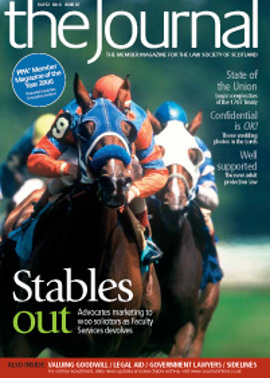Null from the outset?

Patents confer monopolies and they can be revoked if it can be shown that they should not have been granted in the first place. Usually this involves showing that the claimed invention was already known or was an obvious development.
A European patent is a bundle of national patents, and in the case of a European (UK) patent the UK element can be revoked either by certain courts, which include the Court of Session, or the UK Patent Office. The European patent as a whole can be revoked by the European Patent Office (EPO), and such a decision trumps any national decision. National and European revocation challenges can be made concurrently in these different forums, which can lead to interesting legal points, especially as the EPO generally takes much longer to reach a decision than would be the case in the UK national courts.
Suppose an action is brought in Scotland for patent infringement in respect of a European patent (UK). The defender counterclaims for revocation. The pursuer’s action is, however, successful; revocation is refused, and all appeal avenues are exhausted. The pursuer wins damages and expenses, which may even be paid. In the background the defender has been challenging the European patent as a whole in the EPO, and after the dust has settled in the Scottish action the EPO revokes the entire patent. Thus, legally the European patent never existed but damages have already been awarded for the UK element. What effect does later revocation have? Equally, what happens if a decision from the EPO is awaited after the national case is concluded?
A binding decision?
This issue recently arose and the position was clarified in the English Court of Appeal decision in Unilin Beheer BV v Berry Floor NV, Information Management Consultancy Ltd [2007] EWCA Civ 364. As soon as Unilin was granted a European patent it sued Berry for infringement of the UK element in the English Patents County Court, claiming damages. Berry counterclaimed for revocation. Berry was unsuccessful, and damages and costs were awarded. All appeal avenues were exhausted. Unilin were awarded an interim payment of costs for some £500,000, and applied for an inquiry into damages. Berry sought to have the proceedings sisted pending the resolution of their EPO revocation application.
The question arose, was the English judgment binding? Jacob LJ in the Court of Appeal decided that it was and that, despite the possibility that the EPO might later hold the patent to be invalid, the English decree was final and enforceable. Two major rationales for this approach were advanced: certainty and finality, the policies that underlie the doctrine of res judicata. Jacob LJ wanted the law to create a practical and commercial result, but accepted that some legal purists might take the view that it would be unjust for someone to have to pay for doing what, with hindsight, was lawful. The bottom line was that where a final decision had been made on a fair contest between the parties, that should stand as the final answer.
The court accepted that a patent is always susceptible to a fatal attack after grant, but took the view that its decision gave businessmen in the UK comfort that if a UK court revoked a patent the way is clear, and if it is upheld and held infringed then compensation will be payable for past acts.
Scottish case distinguished
The Unilin case is also of interest for its discussion of the First Division’s decision in ITP v Coflexip 2005 1 SC 116. There a patentee had successfully sued the defender for infringement in the Outer House. The defenders reclaimed. In the interim, the EPO revoked the patent. The First Division therefore held that the reclaiming motion had to be allowed and the pursuer was not entitled to damages or interdict. In Unilin, Jacob LJ indicated that he was not surprised by the First Division’s decision. In the Scottish case all avenues of appeal had not been exhausted and the matter was not res judicata. Jacob LJ thought that the Inner House “would be astonished to be told that its decision had a bearing on the point we have to decide”.
Unilin, then, is an important decision, and given the overall aim of producing certainty in a final decree, not just for IP lawyers. With patent revocation, as in so many areas of law, timing is crucial. The Unilin decision is to be welcomed for clarifying the position in relation to patent infringement, and for reminding us all that the law should not be allowed to exist in a vacuum but should be used to give closure and certainty.
Robert Buchan, Maclay Murray & Spens LLP
In this issue
- Court plans with little appeal
- Winning ways
- Forward steps
- Bar to progress
- Dean urges solicitors to stay with fee scheme
- The Union and the law
- Public and confidential
- Adult support: a new generation
- Advice deserts and PDSOs
- Vision 20:20
- Benevolent Fund: a much valued support
- Termites in the basement
- The value of goodwill
- Letters of Engagement Roadshow
- A door almost shut
- Lessons in improvements
- Null from the outset?
- The Tevez affair
- Scottish Solicitors' Discipline Tribunal
- Website reviews
- Book reviews
- Held in check
- Possession undisturbed






